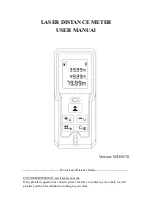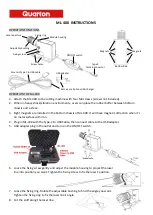
18
Where one or more of these factors is undetermined, it may be better to use a maximum CO
2
value
determined from actual measurements on the process.
Vo (dry)/Ao: This is pre-determined for all pre-programmed fuel types and represents the gross cal-
orific value of the fuel. It will have to be calculated for Fuel types 1 - 4. Most fuel types have known
gross calorific values.
F Factor: This is pre-determined for all pre-programmed fuel types. It will have to be calculated for
Fuel types 1 - 4.
The fuel efficiency calculation is: Efficiency = 100 -% loss due to carbon -% loss due to hydrogen
and water -% loss from unburned fuel.
Loss due to Carbon:
% loss = K1 (T_stack - T_ ambient/CO
2
%
where
K1 = (253 x C)/Qgr
C = % carbon by weight in fuel
Qgr = gross calorific value of fuel in KJ/kg
Loss due to Hydrogen and Water:
% loss = K2(1185 -2 T_a T_stack)
where
K2 = 2.1(%wt.H
2
O + 9 x%wt.H)/Qgr
Qgr = gross calorific value of fuel in KJ/kg
Loss due to Unburned Fuel:
% loss = K3 (CO + H
x
Cy)
CO
2
+ (CO + H
x
Cy)
where:
K3 = a fuel dependent constant
CO = carbon monoxide %
HxCy = Hydrocarbons %
K1 Factor: This is pre-determined for all pre-programmed fuel types. It will have to be calculated
for Fuel types 1 - 4.
K2 Factor: This is pre-determined for all pre-programmed fuel types. It will have to be calculated
for Fuel types 1 - 4.
CO
2
MAX VALUES
FUEL CO
2
Max(%)
Wood 20.4
Natural Gas
12.1
Light Fuel Oil
15.6
Heavy Fuel Oil
15.9
Propane 13.5
Anthracite Coal
18.6
Lignite (Peat)
18.6
Bituminous Coal
18.6
Coke Oven Gas
8.97
Enriched B.F.
15.06
Lean B.F.
15.77
BOS Gas
28.6
















































